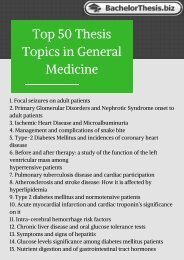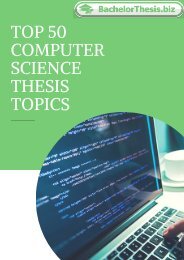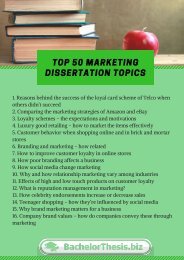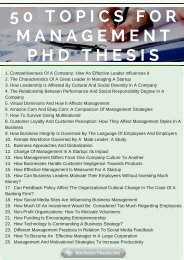Bachelor Thesis Example
Take a look at this article bachelor thesis example https://www.bachelorthesis.biz/wp-content/uploads/2018/02/bachelor-thesis-example.pdf
Take a look at this article bachelor thesis example https://www.bachelorthesis.biz/wp-content/uploads/2018/02/bachelor-thesis-example.pdf
Create successful ePaper yourself
Turn your PDF publications into a flip-book with our unique Google optimized e-Paper software.
S T R A T E G I C A L L I A N C E S<br />
A N D K N O W L E D G E<br />
T R A N S F E R S I N C H I N A<br />
LITERATURE REVIEW<br />
This chapter highlights the theoretical basis for the research that<br />
is aligned to the objectives of the research presented. This<br />
chapter further introduces the primary theoretical concepts, as<br />
well as the empirical studies which underpin the arena in which<br />
the research sits.<br />
The point of this exploratory research aims to understand the<br />
depth in which knowledge transfers currently exist in a number of<br />
strategic alliances, as well as the extent in which these underpin<br />
the competitive success. In order for this aspect to be examined,<br />
the meaning of knowledge, as well as the nature of knowledge<br />
transfers should be understood first and foremost.<br />
At a basic level, these knowledge transfer refer to an exchange of<br />
knowledge, which may either be tacit or explicit, and used in<br />
order to further improve learning within the firm. These<br />
knowledge transfers are positioned increasingly as being highly<br />
essential as a result of their being treated as a capacity that<br />
allows organizations to achieve the position of superiority if such<br />
capacity is achieved and focused on (Moran & Philips, 2001).<br />
Different interpretations regarding knowledge and knowledge<br />
transfers are usually generalized and often interpreted as being<br />
ambiguous. This results to discussions regarding knowledge being<br />
coupled with terms including experience, understanding and<br />
intuition which, even though useful, may fail to appreciate the<br />
essence of the context. Knowledge may also be both implicit<br />
which may be based on an experience, and explicit where the<br />
information is translated and depicted easily.













